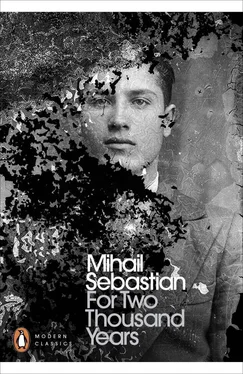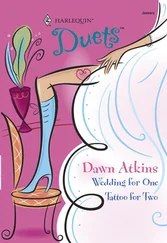Everyone smiled at this comical apparition, and I tried to do the same myself, which took a certain effort, as I pitied him for being ridiculous and was at the same time deeply anxious not to appear friendly to him. I can’t say exactly why, but I felt a strange sense of complicity, which I had an urgent desire to renege upon. I hurriedly sought my diary and acted busy with calculations, suddenly absent from all that was going on beside me. But I monitored my unfortunate neighbour from the corner of my eye.
He had calmed down, secure in the seat he’d occupied, shooting timid glances of gratitude about, carefully assessing each of his fellow-travellers and finally stopping on me. He was still not entirely sure of me, yet offered me the beginning of a cordial smile: a sign he had recognized me.
This suddenly infuriated me even more. It felt that this look, this sense of familiarity, identified me with him, with his silly appearance and awkward presence.
I raised my head and gave him a fierce stare, to make it clear I wanted nothing to do with him. I felt I would die of embarrassment if he spoke to me.
But my hostility didn’t disarm him, and he continued to look at me, nodding his head and blinking frequently.
‘No need to get upset, young fellow. The Jew is a man with baggage. Many troubles, and baggage to match.’
I immediately loved him for these words, and experienced such a wave of shame for how cowardly I had been, towards him and myself, that I felt a need to punish myself, good and proper.
I replied straight off with deliberately exaggerated eagerness, speaking loudly, in order to be heard by everyone in the compartment, so that they’d know that I wasn’t ashamed of this odd old man, to acknowledge that we were friends, that his Jewish accent didn’t bother me, that I wasn’t bothered by his snow-laden boots, that his rude packages didn’t trouble me, that, far from it, I was right at home with everything and had no idea why anyone would consider it comic or want to laugh.
The old man spoke Romanian correctly, with a slight Moldovan-Jewish inflection, so I too deliberately made myself speak with that questioning lilt that comes from Yiddish. This had never happened to me before, but I was determined to punish myself properly, to redeem my earlier cowardice.
I suppose my old Ahasverus understood the game I had fully entered into — his steady, indulgent smile hovered over me like a beam of light from a pocket torch.
‘Forget all that,’ his smile seemed to say, ‘you don’t have to do that on my account. I know you and know you’re not as bad as you wanted to be a moment ago or as good as you’re trying to be now. My journey is long and what do you want me to do with the stones you cast at me or the hands you extend? I, who have time neither to receive them nor respond to them since, well, somewhere out there, far, far away, someone is always waiting for me and I have to travel this path, though my journey may never end.’
He was smiling with this distrust, nodding his head, and I understood that indeed I could do nothing for him, and others could do nothing to him.
He told me his name was Abraham Sulitzer, which disappointed me, since for the symbol to be intact he would have had to have been openly called Ahasverus.
‘What business are you in?’ I asked him. ‘What do you do?’
‘What does a Jew do? I wander.’
He seemed to think that this reply was good enough.
Abraham Sulitzer wanders. That’s his trade. He’s a vendor of Jewish books. In the dozen suitcases, trunks and packages he drags about, he carries all kinds of books: Bibles, Talmuds, commentaries, Hasidic histories, stories from the ghetto, Hebrew poetry, Yiddish literature …
He’s the link between German and Polish publishers and readers in the Moldovan ghettos. He knows every town in Bukovina where books are still studied seriously, all the Bessarabian households where serious thought is given to Talmudic texts, all the neighbourhood synagogues where a problem is still commented on according to Jewish thinking. He has an extensive mental catalogue of all the Jewish manuscripts and publications in the country, knows what town they’re in, and which house. He could close his eyes and tell you exactly who possesses such and such a priceless copy of Megillat Afa by Shabbatai HaKohen, the Lithuanian, a book printed in Amsterdam in 1651. He thinks for a moment and tells you precisely which rabbi, from where, could clarify the great Talmudic dispute in Barcelona of 1240 or of Tortosa in 1413 …
He knows it all, has accumulated it all there behind that narrow forehead, behind those eyes that blink often and questioningly.
This is the first time I am hearing of these books, manuscripts, authors and issues, strange words, names from other centuries, dates from a history I never guessed at. Abraham Sulitzer carries it all with him, just as alive as it was centuries ago, in the mind of the person who wrote and pondered it. He lives in their presence, in their eternal passion, and it is of no account that hundreds of years have passed over these truths, that the face of the world has altered, and that so much time has melted to nothing: these old lights are still shining, these old passions are still burning.
And Abraham Sulitzer carries them everywhere, in the service of their eternal lives.
I bought from him a Yiddish Bible with photographs, for my grandmother, and a history in German by Şapsă Zwi, for myself. I had the impression that it was hard for him to let them go: he seemed to wonder if they were falling into the wrong hands.
*
A terrible snowstorm. In the morning I tried to go down to the Danube, having heard it had frozen over. I would have enjoyed crossing by foot to the far side, but it was impossible to get down to the docks. Great waves of snow were gusting up from the port and into the town.
I decided to have a family get-together. I gathered the grandmothers — Grandmother and Grandma — around the terracotta stove.
Grandmother is Father’s mother. Grandma is Mother’s. Grandmother is about eighty-five, while I don’t think Grandma is over seventy. She’s younger and livelier: still proud, vain and coquettish.
She was very beautiful in her youth and she knew it. The glory of that time still remains in her clear blue eyes, along with a rather proud and mischievous glint.
She wears a hat of straw and silk, tries a dress on three times and tells the seamstress what she needs done. She frequently checks herself in the mirror and gives herself just a touch of powder when nobody is looking. As Grandfather was a watchmaker and jeweller, she has held on to big diamond earrings, a gold chain and a ruby bracelet from their time together.
She wears them all with an air of importance, clearly flattered at the memory of having been a beautiful woman.
Grandmother, on the other hand, has entered old age resigned to everything, without regrets or lingering vanity. For as long as I have known her, she has had the same simple, decorous black dress with ordinary buttons of bone. White-haired, tired, calm — she’s a storybook grandmother. She speaks the rough country-Romanian of a Muntenian village. She was born here, in this town, in the period of the Russian protectorate and has lived her long life in this county. For years her father worked on an estate in Gropeni, managing the accounts, and later her husband, my paternal grandfather, worked in the port. She has lived in the company of the Danube. When I ask, and have time to listen, she tells of the wonders of the past century, about the city and the townsfolk, and about high society in those years. In particular, she talks about a ball, her first, which must have been a sensation in the life of the town. From a few details she has given me, I suppose it was in 1848, perhaps around the time of the Proclamation of Islaz. And so history and the chronicles of my family are intertwined.
Читать дальше












